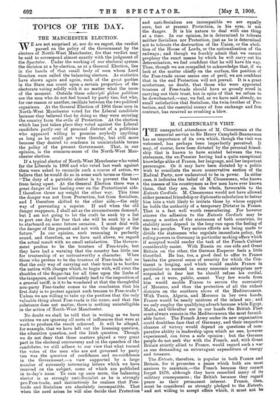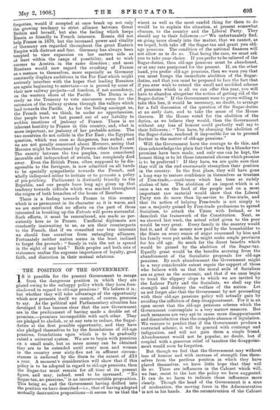M. CLEMENCRAIPS VISIT. T HE unexpected attendance of M. Clemenceau at
the memorial service to Sir Henry Campbell-Bannerman has an importance of its own which, though the visit was welcomed, has perhaps been imperfectly perceived. It may, of course, have been dictated by the personal friend- ship that is known to have existed between the two statesmen, the ex-Premier having had a quite exceptional knowledge alike of France, her language, and her important personages. Or it may have been dictated by a politic wish to conciliate the more conservative section of the Radical Party, now understood to be in power. In either case, it indicates the belief of M. Clemenceau, who knows the masses of his countrymen as few men have ever known them, that they are, on the whole, favourable to the Entente Cordiale. M. Clemenceau would not have allowed either personal friendship or diplomatic calculation to betray him jute a visit likely to irritate those by whose support he bolds the authority of a temporary Dictator in France. That is a fact well worth remembering. For however sincere the adhesion to the Entente Cordials may be among a section of the statesmen of both countries, its stability must depend in the long run upon the feeling of the two peoples. Very serious efforts are being made to divide the statesmen who regulate immediate policy, the ruling powers in Germany in particular making offers which if accepted would render the task of the French Cabinet considerably easier. With Russia on one side and Great Britain on the other, the German Emperor feels a little throttled. He has, too, a good deal to offer to France besides the general sense of security for which the Con- tinent is longing, and which would enable France in particular to succeed in many economic enterprises now suspended in fear lest 'he should refuse his cordial, and, as it were, public, assent. Very few words from him would enable France to secure the suzerainty of Morocco, and thus the protection of all the richest districts on the southern shore of the Mediterranean. With Tunis, Algeria, and Morocco in her own hands, France would be nearly mistress of the inland sea ; and we only employ the qualifying adverb because while Egypt, Malta, and Gibraltar are in our bands the British Fleet must always remain in the Mediterranean the most formid- able factor. The French Army under its new organisation could doubtless face that of Germany, and their respective chances of victory would depend on questions of com- parative ability in leadership upon which no one, however experienced, can form a safe opinion ; but the German people do not seek ifar with the French, and, with Great Britain strictly allied to France, would regard such a war as one demanding an extravagant expenditure of energy and treasure.
The Entente, therefore, is popular in both France and Britain, for it promotes a peace which both are most anxious to maintain,—the French because they cannot forget 1870, although they have remedied many of its military consequences ; the British because they regard peace as their permanent interest. France, then, must be considered as strongly pledged to the Entente, and not willing to accept offers which, it must not be forgotten, 'would if accepted at once break up not only the growing tendency to strict alliance between Great Britain and herself, but also the feeling which keeps Russia so friendly to French interests. Russia did not help France in 1870, but the increased power and. vitality of Germany are regarded throughout the great Eastern Empire with distrust and fear. Germany has always been tempted to view expansion on her eastern side as at least within the range of possibility, and to wish success to Austria- in the same direction;. and most Russians would. now regard. the crushing of France as a menace to themselves, more especially as Germany constantly displays ambitions in the Far East which might seriously interfere with the hopes that leading Russians are again beginning to entertain—as is proved by some of their new railway projects—of freedom, if not ascendency, on the western shore of the Pacific. The Duma is as ready as the Treasury to vote enormous sums for the extension of the railway system through the valleys which lead towards the Pacific. As for the feeling amongst us, the French need, we think, be under no apprehension. Our people have at last passed out of any liability to sudden emotions of jealousy of France. There is no inherent hostility to France in this country, and, what is more important, no jealousy of her probable action. The two countries do not collide in the Far East ; the Egyptian question, which was once so dangerous, has ended ; and we are not greatly concerned about Morocco, seeing that Morocco might be threatened by Powers other than France. The enmity between the two peoples, once considered incurable and independent of events, has completely died away. Even the British Press, often supposed to be dis- agreeable to the foreigner, is now admitted on all hands to be specially sympathetic towards the French, and wholly indisposed either to irritate or to promote a policy of pin-pricking. Parliament is distinctly friendly to the Republic, and our people have long ago given up that tendency towards ridicule which was marked throughout the reigns of both branches of the houie of Bourbon.
There is •a feeling towards France in this country which is as permanent in its character as it is warm, and we are convinced that no efforts on the part of those interested in breaking up the Entente will prove successful. Such efforts, it must be remembered, are made as per- sistently here as " in France. Unofficial diplomats are cOnstantly insinuating to us, as are their counterparts to. the French, that if we consulted our true interests we should free ourselves from entangling alliances. Fortunately neither nation seems in the least inclined. fol" forget the proverb : "Surely in vain the net is spread. in the sight-of any bird." Both peoples and both sets of statesmen realise' the supreme importance of loyalty, good faith; and discretion in their mutual relations.









































 Previous page
Previous page